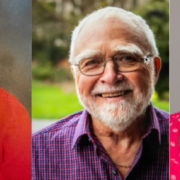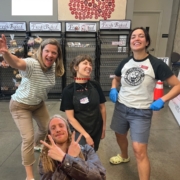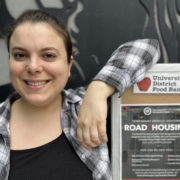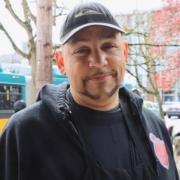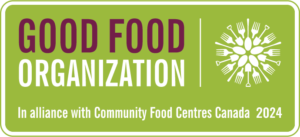PATTY WHISLER
How did you get involved with the Food Bank?
The timing was just remarkable. I can’t tell you what a glorious process it was to set up. Everything just fell into place and everyone wanted to help. The U District was filled with people who had no homes, no food, nowhere to go and we all came together to make the food bank happen. It felt like there a wonderful guiding spirit that helped put this together.
Dick Cunningham was instrumental in getting the churches behind it and it felt like Trish Twomey appeared out of the blue and was so phenomenal, as was the University Christian Church community. Everyone should have an experience like this in their lifetime.
Were you also on the board?
I wasn’t on the board for the Food Bank but I organized the U-District Service League and this was our response to proliferating social betterment in the neighborhood. We knew it would help if we had an umbrella organization for all the services we’d like to establish. I brought together all the services in the neighborhood to support each other.
What was it like gathering the community together in the early days to donate or volunteer?
This was Trish’s domain – we met every month as part of the Service League to get the Food Bank off the ground. We tried to get as many church members involved at that point as well. University Presbyterian had a large and involved congregation who brought a lot of donations and people to help boost the effort.
What was the biggest challenge to overcome in the beginning?
We didn’t have any competition in the area, and everybody got right in there and did a wonderful job of helping. But in the beginning, initially, it was hard to get the space donated, but then University Christian Church stepped up and we were all so grateful.
What is your fondest memory of your time volunteering Food Bank?
The paper drives that Trish organized. One time in particular, I remember her in the back of the truck putting everything together and surrounded by supplies. She had a huge smile on her face even though it was a lot of work. That is a memory I love. I wish someone had a picture of Trish in that moment.
Any other thoughts or memories you’d like our community to know?
The thing that made it go was that everyone sensed a greater need and the city was so helpful. People learned to trust each other and that was a wonderful thing to see grow as we headed into the next decade of community planning. Residents, businesses, faith community all working together made it far better. It’s one thing we did that was a big success because we all came together.
This trust grew out of a common goal and it’s what we need now to bring everyone together. Tackling a local problem doesn’t just happen, we need to get the engine going again, join hands. This can happen again.
Also, the new food bank is magnificent and Joe is a miracle worker.
DICK CUNNINGHAM
How long were you a pastor at University Christian Church?
Eighteen years. I managed education and social justice, which led to the Food Bank. I also ran a program for seniors called the 6:10 Club and the latch-key program, focusing on kids at University Heights grade school, which was before and after school.
Was there a certain moment or series of events that lead you to co-found the Food Bank?
First thing is the dynamic of the members of the church, very progressive, and cared about what they did in the world. The senior pastor, and my colleague, James Stockdale was an advocate for the church being relevant to the broader University District community. That was in the 1970s. A lot of churches were on the margin with the Vietnam War, churches were split, many didn’t feel they should be socially active and some did, including ours.
What was it like gathering the community together in the early days to donate or volunteer?
We had a space in the basement that used to be the church boiler room built in the early 1900s, so we said let’s use this space. It had an outside entrance and alley access. People were very willing to engage in it and volunteer. They would come one or three times a week. It’s a basic human need, so why wouldn’t you do it?
What was the biggest challenge to overcome in the beginning?
Where are we going to get the food from? The Church Council of Greater Seattle and the Washington Association of Churches operated out of our church. Boeing had had some bad days and people in the church rallied around that and realized in this country how can we let people go hungry? So it was engrained in our community already. Then Trish set up food drives at various churches and grocery stores and at the UW campus. Trish was a delightful person to take charge of that. She was a dynamo.
What’s your proudest achievement during those years?
The church responded to the needs of people in the community, and that’s my vision of what the church ought to be doing. Our church was concerned about what was happening today and how can we could help it. There was a line around the block at the Food Bank and you couldn’t ignore it. The community saw the need and stepped up to help.
Boeing was a visible example of people who had lost their jobs, as well as seniors in the community who lived alone or didn’t have resources. The hunger issue is one that is very subtle because who wants to admit that they are hungry in a country with so much food?
Any other thoughts or memories you’d like our community to know?
Trish Twomey was the first executive director and was the most valuable employee that I have ever worked with. I’ve done a lot of stuff in my life and she was an excellent person to grasp the concept and move it forward. She managed the food bank and the 6:10 Club.
Patty is a gem. She was referred to as the mayor of City Hall in the U-District. She was phenomenal at bringing people together and organizing. We worked together on many projects, including trying to create a youth hostel in the church that ultimately didn’t work out.
These are two powerful women who need to be noted for their work in helping other people.
TRISH TWOMEY
What years were you Executive Director of the UDFB?
May of 1983 until summer 1993, about 10 years.
How did you get involved?
I was working at University Christian Church running the congregation meal plan and every month, Patty Whisler who worked for the City of Seattle, held meetings with all service providers in the neighborhood. The closest food bank at the time was in Fremont and there was a growing need in northeast Seattle. So Patty started looking around at different churches and locations to operate out of. The University Christian Church was so large, they offered their basement space and it just started to grow organically from there. I made a job for myself in a way, I already had an office there and just took this on.
What was it like gathering the community together in the early days to donate or volunteer?
Patty led this charge. She was a great community leader. She pulled together a board of directors with people from local churches, clubs, the UW and more. It was amazing to see the community come together. We’d get food from Food Lifeline and NW Harvest and were able to start feeding the neighborhood.
How many families a week did you serve?
We were busy right away and quickly became one of the busier locations in the city. KING5 News was there the first day we opened and we started serving maybe a couple hundred families a week. It grew later to 600 families. Welfare reform in the 80s saw numbers increase as well.
What was the biggest challenge to overcome in the beginning?
Before we opened, I had the opportunity to visit other food banks in Seattle and learn so much from those executive directors. So our operations were solid. The biggest challenge in the early days was getting enough food.
I would often drive to NW Harvest to get more food because we were having a hard time keeping up with demand. About a year or two in we received funding from the City of Seattle. We got donations from local businesses in the neighborhood like Safeco Insurance and many others. We had moments of scarcity and then the money or food would appear and always worked out.
We started running a big campus food drive with all departments at UW, which was a huge amount of food. Hundreds of tons were collected. We had supermarket Saturday’s where we’d hand people lists of what was needed. And the more people learned about what we were doing, donors would send in checks, service clubs were sending money. I don’t remember being under-resourced after those first months. The UW provided all of our volunteers; it was a huge part of our success back then.
How has food insecurity changed in Seattle over the last 40 years?
It’s kind of the same story but in a different time. In the ’80s we were seeing a lot of refugees from the former Soviet Union, and we’re still seeing this and serving a large refugee population in our state.
There’s a lot more attention paid to this issue now and new funding to support it. And, of course, the scale of the food banks now with all staff members and larger shopping spaces is much improved. The shopping with dignity model is more available now, though we’ve always been aware of this with our shoppers and respectful. The Seattle Food Committee was mostly women then, it grew to be more men and now it’s younger people.
What is your fondest memory of your time as executive director?
It was always there to help people. The mom with four kids who calls day-of for a home delivery. I feel like we surprised people and were there to help them. People who came after hours to the church to get food, and I was happy to help them. People were always surprised and happy that we answered the phone, we really wanted to help people, we had resources and lots of food and always did what we could.
One time I received a call from a Food Bank director on Capitol Hill who needed baby formula for a young mother who was mixing flour and water to make formula. I grabbed formula and raced over to Capitol Hill to give it to her. We had things like formula and diapers, we were so well resourced. And to the help people in a variety of circumstances was so meaningful.


